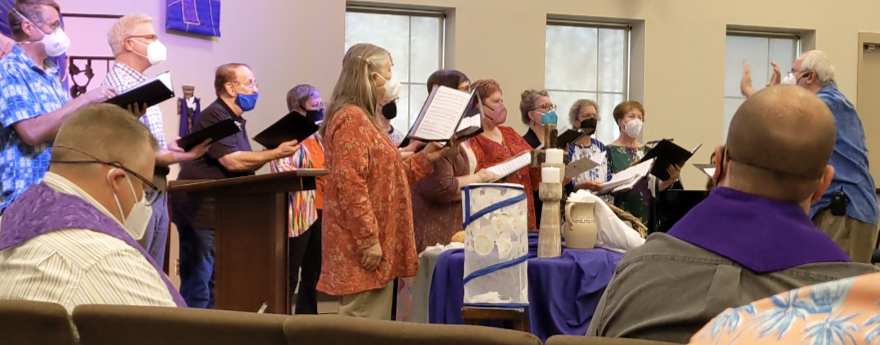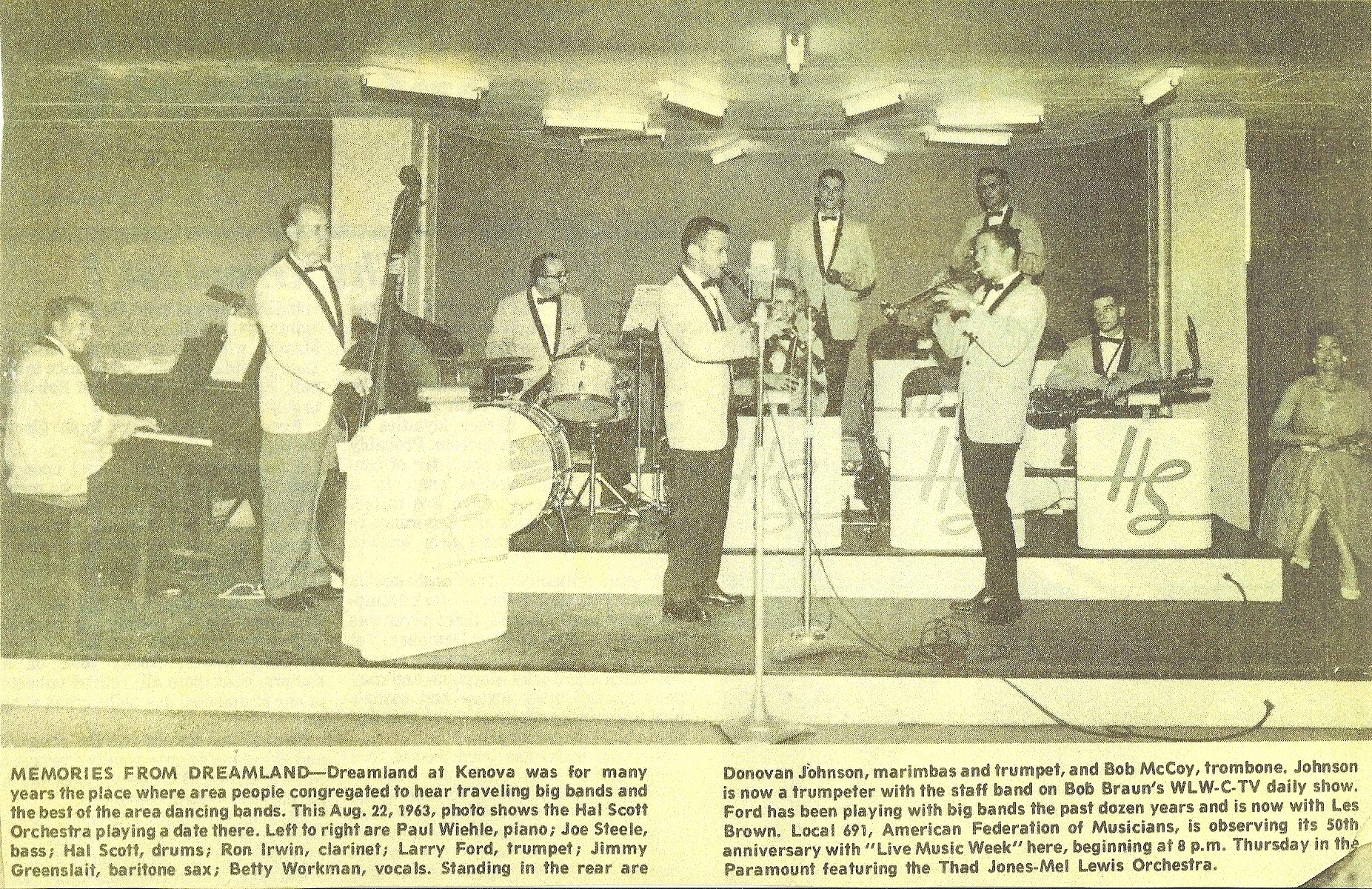Not sure it was my first rehearsal last Thursday evening that made it official. It must have been three days later, during the first service in which I stood at the front of the sanctuary at The Welcome Table Christian Church not five minutes from our house, cradling a black vinyl folder holding sheet music in my right hand while singing “Can’t Carry These Burdens Alone” with 11 other talented vocalists including director Michael Black.
That’s when I became a choir member for the first time in about 50 years.
And after just those two times getting together with the group, I can tell I’m going to love it.

Many things about this church are pretty small — the sanctuary, the congregation, even the budget. And the choir. But what’s huge are the hearts of the church’s members, and that starts with its pastor, Jeremy Skaggs, an Army veteran. Many of those in the congregation are elderly, and that includes its impressive choir. I’m not only the group’s newest member — at 61, I’m its youngest.
I started attending The Welcome Table last fall after years away from church since our two kids (now almost 21 and 18) were young and attended preschool at nearby St. Barnabas United Methodist Church in SW Arlington. The Welcome Table belongs to the Disciples of Christ, about which I don’t know much. All I know is that it’s the most inclusive and genuinely open-hearted church I’ve ever attended.
(Here’s a video of Sunday’s choir performance:
https://photos.google.com/u/1/photo/AF1QipM1GIgZ_bXqznmFIvsRQFQrMRdGmXK0WN_iI1RX)
In September 2017, The Welcome Table adopted this abiding statement:
“The Welcome Table Christian Church is an open and affirming community of faith. We believe that all of humanity is created in the image of God. We are one people, celebrating God’s gift of diversity in all of its forms and rejoicing in the relationships that develop in the life of the church and community. By supporting, accepting, and loving unconditionally people of all nationalities, ethnic backgrounds, ages, sizes/shapes, physical or mental abilities, gender expressions/identities, sexual orientations and all family structures, we affirm God’s call to love our neighbor. Our faith calls us to work toward the day when all of God’s people have justice in this life with the promise of God’s mercy in the life everlasting.
”Welcome all who seek God’s life-giving grace. Come as you are, that together, we might make a world of difference.”
Those aren’t just words on a website. The church and its members believe in their significance and live them every day.
During my childhood, we didn’t attend church, even though I went to school at St. Matthew Lutheran in Houston from first to halfway through sixth grade (brother Isaac was a year ahead of me) before we moved to public school in Conroe, north of the big city. We didn’t even attend Sunday services at St. Matthew.
The Welcome Table’s congregation has been around for 15 years from when the church was in east Fort Worth and called Trinity Christian Church. Its new building near us opened in 2016, when the name changed and Jeremy and his family moved from Oklahoma to Mansfield and he became the church’s leader. A number of the members, whom I’m gradually getting to meet, are Fort Worth residents, but it’s becoming more and more of an Arlington congregation, members have told me.

But back to the choir. For some time, in addition to wanting to get back to church again — not necessarily religiously (sorry), but as often as I can make it — I’ve thought it would be cool to join a church choir. A big reason is that I’ve always loved music and have a background in it, having played the clarinet growing up and taken piano lessons for four years after my late father gave us his parents’ old Haddorff upright (circa 1937) in 2008. My grandparents Frank and Alma both played it, as did my father Clark when he was a young boy and my grandfather’s mother Addie, a piano instructor and concert pianist who died in 1959.
I’ve always thought I have a decent singing voice, although certainly nothing worthy of a part in a Broadway musical. And, although I haven’t been in organized choir since those days at St. Matthew long ago, I thought it would be fun to be part of a music group again. Lord knows, even though I still have the clarinet Dad bought me in 1972 for beginner band and I can still play notes that sound like a clarinet should, it would take a ton of practice for me to ever join a community band.

For some time, though, perhaps my main motivation for wanting to join a church choir is Betty. Those of you who’ve read my endless birth family writings over the past 17 years know who Betty was, and you know my biological mother had an immense singing gift. I don’t have that, but I’d like to think that lifting my voice every Sunday will be a way of not only praising God but of honoring Betty.
Not long after I started attending The Welcome Table, I was talking to one of the choir members, Kevin Anderson, who also works in the booth handling the streaming of services on Facebook Live. Not including the director, there were only two men in the choir — Kevin, who’s in his mid-60s, and a fellow named Harven, in his late 70s. Kevin asked if I’d be interested in joining; I said I would but needed to talk to my boss to get approval for the Thursday evening rehearsals, which fall during my Dallas Morning News remote editing shift (noon to 8 … or whenever).
As I figured she would be, Denise was fine with me starting my shift early and taking an hour for rehearsal (it helps that the church is so close to home). So I’ll be starting at 11 a.m., slipping away at 6:30 p.m. to rehearse, then getting back home to finish my work. Thursdays are the day my colleague Rachel and I team up to produce our Sunday Business section — she designing the pages and me doing the editing.
Our choir doesn’t stand at the front of the sanctuary for the entire service and lead all the hymns like in many larger churches. We generally sing only one piece of special music during each service. The group took a couple of months off when omicron set in and just started back up in recent weeks. So I talked to Kevin again after the March 27 service and he introduced me to the director Michael, who introduced me to his wife, Pam, another choir member. (Kevin’s wife, Janet, is also in the choir.)
Kevin, by the way, is a remarkable musician — he also plays the trombone, has his music bachelor’s and master’s from TCU and went on to become a band director at several Fort Worth-area high schools for about 30 years. He’s a member of a local group called the Northeast Orchestra and says he’s been in some kind of performing group — band, orchestra, jazz band — since college, a run of over 40 years.
For my part in the choir, here’s what I’ll have to work through (which I’m confident I can): Although I’ve been able to read music instrumentally since I was an 11-year-old 7th-grader at Washington Junior High in Conroe, reading it chorally just isn’t the same. I can’t really pick out pitches by ear, but I can start with C and work my way up or down from there. So, when I’ve sung from a hymnal in church in the past, I’ve done pretty well because I can figure out the intervals between notes.

But I grew up playing the clarinet, a treble clef instrument. When I took piano, I learned to read notes on the bass clef staff, too, but I haven’t played much piano the past 10 years, so I’m a bit rusty on bass clef. So I’ll have to refresh on that because to sing tenor/baritone/bass, I’ll need to read bass clef, where notes are two steps up from treble clef — in other words, a C in treble clef is an E in bass clef, a D in treble clef is an F in bass clef and so on.
It’ll take some time, but I’ll figure it out. I don’t want to be one of those singers who just listens to the people around him and follows their lead — although, standing between two veterans like Kevin and Harven, I could do that and get by just fine. I’d rather pull my weight by learning every pitch. I know the note values, the rests, the signatures, the crescendos and other markings. I just need to get the pitch-reading down.
This is for you, Betty. Although, regrettably, we never met, I’m grateful that you instilled such a love for music in me.
Beautiful statement on how life should be.
Sent from the all new AOL app for Android
LikeLiked by 1 person
Hello and thank you, Jerry! I appreciate your reading my blog and your kind comment. Hope you and your family are in good health and staying safe. 🙂
LikeLike
Enjoy life as a choir member! Sounds like it’s about time you get back to that.
LikeLiked by 1 person
Thank you, Bonnie! Now I need to figure out which Bonnie this is, lol. I’m going to assume BSB! 🙂
LikeLike
I love the philosophy of this church.
LikeLiked by 1 person
Thanks, Holly. We do too. It’s definitely perfect for our family! 🙂
LikeLiked by 1 person